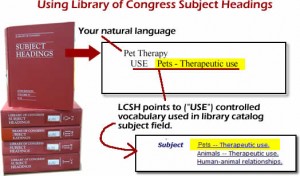8.8 Key Words and Subject Headings
People in different disciplines have their own jargon and terminology for discussing their field and the ideas they work with. You must know how to decode this language in order to be able to talk to experts, understand what they are writing, and make the material clear for the non-specialist audience that will see the final message.
The language of a topic is also the key that opens the door to effective searching. Language is the access code through which formal collections of information in libraries and databases are indexed and organized. In addition, terminology shifts over time with the introduction of new words and as some language falls out of use and is replaced.
Political perspectives also play a role in decoding language. A body of water in the Middle East is called the Persian Gulf by some and the Arabian Gulf by others, depending on their political perspective. Think about the different connotations of the terms “pro-choice” or “pro-abortion;” “right-to-life” or “anti-choice.” You must understand how the audience will react to language and terminology choices. During your information search you must use appropriate terminology to locate relevant information.
Subject Headings
A major characteristic of information searching is the use of subject terms or headings. The major purpose of subject headings systems is to provide a standardized method of describing all information in the same general subject area so that everything pertaining to a topic can be identified. When you are searching for information in print or digital form, you are likely to have a general notion of the topic area you are researching rather than a detailed list of authors or titles of materials you are seeking. For that reason, information catalogers and indexers have tagged records with subject headings as a finding tool.
Indexers spend enormous amounts of time developing subject headings that accurately reflect the structure of information in a subject area. You can use these subject headings in many ways. They appear on the records in a library’s catalog; they appear in the entries of indexes and the headings in abstracts, or they may be used to organize material on web sites.
Information organizers may use the subject classification system created by the Library of Congress, a system that is called the Library of Congress Subject Headings and which is particularly appropriate for very large collections. Smaller collections may use the Sears List of Subject Headings. Special collections may have their own subject headings, such as the Medical Subject Headings used, obviously, in medical collections.
You do not need to know the intricacies of these systems. The point is that you can be a much more efficient information searcher if you know how to use the specific subject headings for your search.


